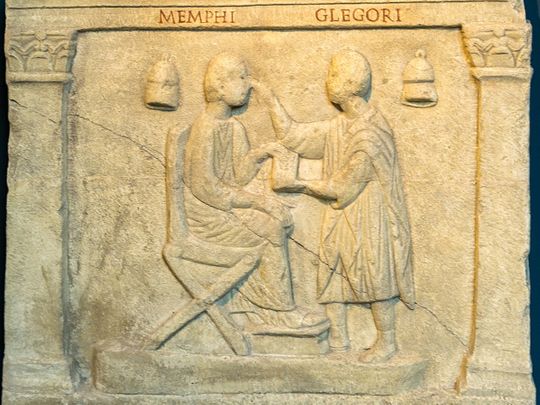
The ancient Romans are well known for their roads, military strategies and inventions. But they had some interesting thoughts on the subject of staying healthy, too.
Click start to play today’s Spell It, where we discover the ‘main’ practices that ancient Romans used to preserve their health.
Here’s how they took control of their health and wellbeing, according to a report in UK-based history magazine History Extra:
1. They took responsibility for their health
The second century Roman-Greek physician Galen emphasised in his writings that it was a person’s duty to take care of his/her body. Most Romans followed a ‘hygienic approach’, striving for a good balance between getting enough sleep, taking in fresh air, diet, exercise and hydration.
2. They consumed a healthy diet
Recent research on materials unearthed from several Roman sewers has given historians insight into the kinds of food that were consumed by the average Roman. At the time of the eruption of Mount Vesuvius in Italy, for instance, in 79AD, the population of Herculaneum was used to an incredibly healthy, mineral-rich diet, comprising high levels of seafood and vegetable protein. They also spent plenty of time in Roman gardens. Roman writer Pliny the Younger, in one of his letters, described walks along tree-lined pathways and avenues edged by box hedges at his villa in Tuscany. Spending time admiring the view, taking in a cool breeze and enjoying the pleasant weather was important to people at the time.
3. They chose their physicians carefully
Roman historian Pliny the Elder summarised society’s suspicious view of medical professionals at the time: “Physicians acquire their knowledge from our dangers, making experiments at the cost of our lives. Only a physician can commit homicide with complete impunity.” Interestingly enough, it wasn’t clear what physicians did to gain their titles, since there were no degrees, examinations or professional licensing procedures in ancient Rome. Since anyone could call themselves a physician, it was important to pick someone who could legitimately back their claim with a proven track record. To gain more insight into their abilities, Romans held public displays of anatomical skills, or medical competitions where people were invited to come see the physician’s talent for themselves. Another reason they were averse to doctors is because ancient Romans prided themselves on their value of self-sufficiency. The head of the house (pater familias) was usually the chief healer, responsible for the health of his family and estate workers.
4. They focused on their eyes
The eyes were the most privileged body part, in the Roman world. It even had spiritual symbolism, as a transition point between the self and the outside world, which is why ancient Romans would often craft the eye in gold, bronze or plaster, as an offering of gratitude to their deities. Inadequate hygiene and dusty roads contributed to eye-related issues in the era, which is why eye care was so important to the Romans.
5. They were experts in wound care
Roman soldiers battled across Europe and other parts of the world, so slashing and cutting wounds from long swords were common injuries. Fractures, head and eye injuries, and chest wounds were commonly treated as well, so ancient Romans became adept at treating trauma wounds. They developed procedures on out how to clean, dress and stitch wounds, and set up more complicated surgical processes that involved removing bone fragments, stopping bleeding or extracting spear points. Military physician Dioscorides also explained how honey dressings could stop infections; he wrote: “Honey is cleansing, opens pores, and draws out fluids. Boiled and applied it heals flesh that stands separated.” Some soldiers, called the capsarii, were trained in first aid and provided basic wound care right at the scene of battle.
What do you think of these health-focused Roman practices? Play today’s Spell It and tell us at games@gulfnews.com.



